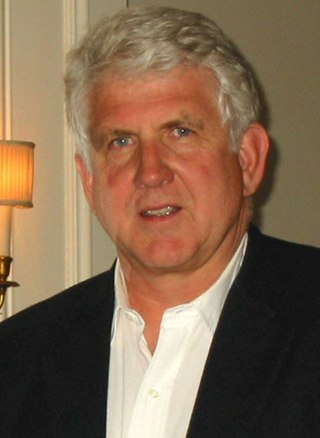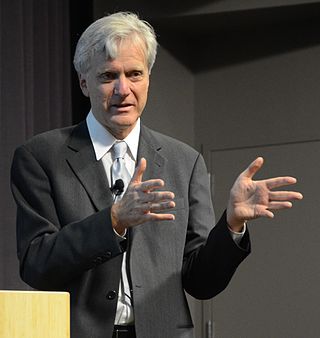
Ethernet is a family of wired computer networking technologies commonly used in local area networks (LAN), metropolitan area networks (MAN) and wide area networks (WAN). It was commercially introduced in 1980 and first standardized in 1983 as IEEE 802.3. Ethernet has since been refined to support higher bit rates, a greater number of nodes, and longer link distances, but retains much backward compatibility. Over time, Ethernet has largely replaced competing wired LAN technologies such as Token Ring, FDDI and ARCNET.

A local area network (LAN) is a computer network that interconnects computers within a limited area such as a residence, school, laboratory, university campus or office building. By contrast, a wide area network (WAN) not only covers a larger geographic distance, but also generally involves leased telecommunication circuits.

SRI Future Concepts Division is a research and development company in Palo Alto, California. It was founded in 1969 by Jacob E. "Jack" Goldman, chief scientist of Xerox Corporation, as a division of Xerox, tasked with creating computer technology-related products and hardware systems.

3Com Corporation was an American digital electronics manufacturer best known for its computer network products. The company was co-founded in 1979 by Robert Metcalfe, Howard Charney and others. Bill Krause joined as President in 1981. Metcalfe explained the name 3Com was a contraction of "Computer Communication Compatibility", with its focus on Ethernet technology that he had co-invented, which enabled the networking of computers.
Xerox Network Systems (XNS) is a computer networking protocol suite developed by Xerox within the Xerox Network Systems Architecture. It provided general purpose network communications, internetwork routing and packet delivery, and higher level functions such as a reliable stream, and remote procedure calls. XNS predated and influenced the development of the Open Systems Interconnection (OSI) networking model, and was very influential in local area networking designs during the 1980s.

Ronald Linn Rivest is an American cryptographer and computer scientist whose work has spanned the fields of algorithms and combinatorics, cryptography, machine learning, and election integrity. He is an Institute Professor at the Massachusetts Institute of Technology (MIT), and a member of MIT's Department of Electrical Engineering and Computer Science and its Computer Science and Artificial Intelligence Laboratory.

Apollo Computer Inc., founded in 1980 in Chelmsford, Massachusetts, by William Poduska and others, developed and produced Apollo/Domain workstations in the 1980s. Along with Symbolics and Sun Microsystems, Apollo was one of the first vendors of graphical workstations in the 1980s. Like computer companies at the time and unlike manufacturers of IBM PC compatibles, Apollo produced much of its own hardware and software.

The Sloan School of Management at Massachusetts Institute of Technology is the business school of the Massachusetts Institute of Technology, a private university in Cambridge, Massachusetts.

Robert "Bob" Melancton Metcalfe is an American engineer and entrepreneur who contributed to the development of the internet in the 1970s. He co-invented Ethernet, co-founded 3Com, and formulated Metcalfe's law, which describes the effect of a telecommunications network. Metcalfe has also made several predictions which failed to come to pass, including forecasting the demise of the internet during the 1990s.

Andreas Maria Maximilian Freiherr von Mauchenheim genannt Bechtolsheim is a German electrical engineer, entrepreneur and investor. He co-founded Sun Microsystems in 1982 and was its chief hardware designer. As of July 2024, Forbes estimated his net worth at $24.3 billion.

Computer Science and Artificial Intelligence Laboratory (CSAIL) is a research institute at the Massachusetts Institute of Technology (MIT) formed by the 2003 merger of the Laboratory for Computer Science (LCS) and the Artificial Intelligence Laboratory. Housed within the Ray and Maria Stata Center, CSAIL is the largest on-campus laboratory as measured by research scope and membership. It is part of the Schwarzman College of Computing but is also overseen by the MIT Vice President of Research.

Charles Patrick "Chuck" Thacker was an American pioneer computer designer. He designed the Xerox Alto, which is the first computer that used a mouse-driven graphical user interface (GUI).
LattisNet was a family of computer networking hardware and software products built and sold by SynOptics Communications during the 1980s. Examples were the 1000, 2500 and 3000 series of LattisHub network hubs. LattisNet was the first implementation of 10 Megabits per second local area networking over unshielded twisted pair wiring in a star topology.
Mark E. Dean is an African American inventor and computer engineer. He developed the ISA bus, and he led a design team for making a one-gigahertz computer processor chip. He holds three of nine PC patents for being the co-creator of the IBM personal computer released in 1981. In 1995, Dean was named the first ever African-American IBM Fellow.
3+Share, also known simply as 3+ or 3 Plus, was a pioneering file and print sharing product from 3Com. Introduced in the early 1980s, 3+Share was competitive with Novell's NetWare in the network server business throughout the 1980s. It was replaced by the joint Microsoft-3Com LAN Manager in 1990, but 3Com exited the server market in 1991.
David Reeves Boggs was an American electrical and radio engineer who developed early prototypes of Internet protocols, file servers, gateways, network interface cards and, along with Robert Metcalfe and others, co-invented Ethernet, the most popular family of technologies for local area computer networks.
John F. Shoch is an American computer scientist and venture capitalist who made significant contributions to the development of computer networking while at Xerox PARC, in particular to the development of the PARC Universal Protocol (PUP), an important predecessor of TCP/IP.
John A. Murphy is an American inventor and computer engineer credited with inventing ARCNET, the first commercial networking system, in 1976. He was working for Datapoint Corporation at the time. His biography appeared in the IT History Society website.

The Sniffer was a computer network packet and protocol analyzer developed and first sold in 1986 by Network General Corporation of Mountain View, CA. By 1994 the Sniffer had become the market leader in high-end protocol analyzers. According to SEC 10-K filings and corporate annual reports, between 1986 and March 1997 about $933M worth of Sniffers and related products and services had been sold as tools for network managers and developers.













